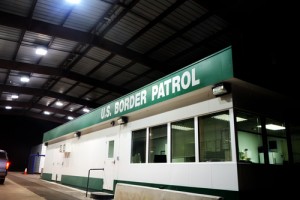Case of teen shot on Mexican side of border by US agent is returned to federal appeals court

Shutterstock
The U.S. Supreme Court has returned to a federal appeals court a case that claims constitutional protections for a Mexican teen shot and killed by a U.S. border patrol agent.
The teen was on the Mexican side of the border when he was shot by the agent, who was standing on U.S. soil. In a per curiam opinion (PDF), the Supreme Court returned the case to the New Orleans-based 5th U.S. Circuit Court of Appeals.
The case was filed by the family of Sergio Hernandez, who was 15 when he was shot and killed in June 2010.
The U.S. Border Patrol had said Hernandez was throwing rocks to distract agents from an immigrant smuggling operation. The family’s lawyer said he was playing a game with friends in which they dared each other to run up a culvert incline, touch the border fence, then run back to the bottom of the culvert.
The Supreme Court said the 5th Circuit should reconsider the case based on a decision issued last week by the high court.
“The facts alleged in the complaint depict a disturbing incident resulting in a heartbreaking loss of life,” the Supreme Court said. “Whether petitioners may recover damages for that loss in this suit depends on questions that are best answered by the Court of Appeals in the first instance.”
The en banc 5th Circuit had found no violation of Hernandez’s Fourth Amendment rights, and had said the border agent was entitled to qualified immunity on a Fifth Amendment claim. Because the court resolved the case on constitutional grounds, it did not decide whether Hernandez’s family could sue for a tort violation using a so-called Bivens remedy, named for the case that found an implied right of action to sue federal officials who violate the constitutional ban on unreasonable searches and seizures.
The Supreme Court said the 5th Circuit should evaluate the Bivens question based on its June 19 decision finding that immigrants detained after the Sept. 11 attacks had no implied right of action to sue for alleged constitutional violations.
A decision in Hernandez on the Bivens claim could avoid the need to rule on the Fourth Amendment issue, which is “sensitive and may have consequences that are far reaching,” the Supreme Court said.
The Supreme Court said the 5th Circuit should not have granted qualified immunity, however, because it based its decision on a determination that Hernandez was an alien with no voluntary ties to the United States. Those facts weren’t known to the border agent at the time of the shooting. “Facts an officer learns after the incident ends—whether those facts would support granting immunity or denying it—are not relevant,” the Supreme Court said.
Justice Neil M. Gorsuch did not take part in the opinion.
The case is Hernandez v. Mesa.
Related articles:
ABAJournal.com: “Court to decide whether Constitution grants protections to Mexican boy killed by US border guard”
ABAJournal.com: “Supreme Court to consider suit over border agent’s shooting of teen on Mexican side of the border”



